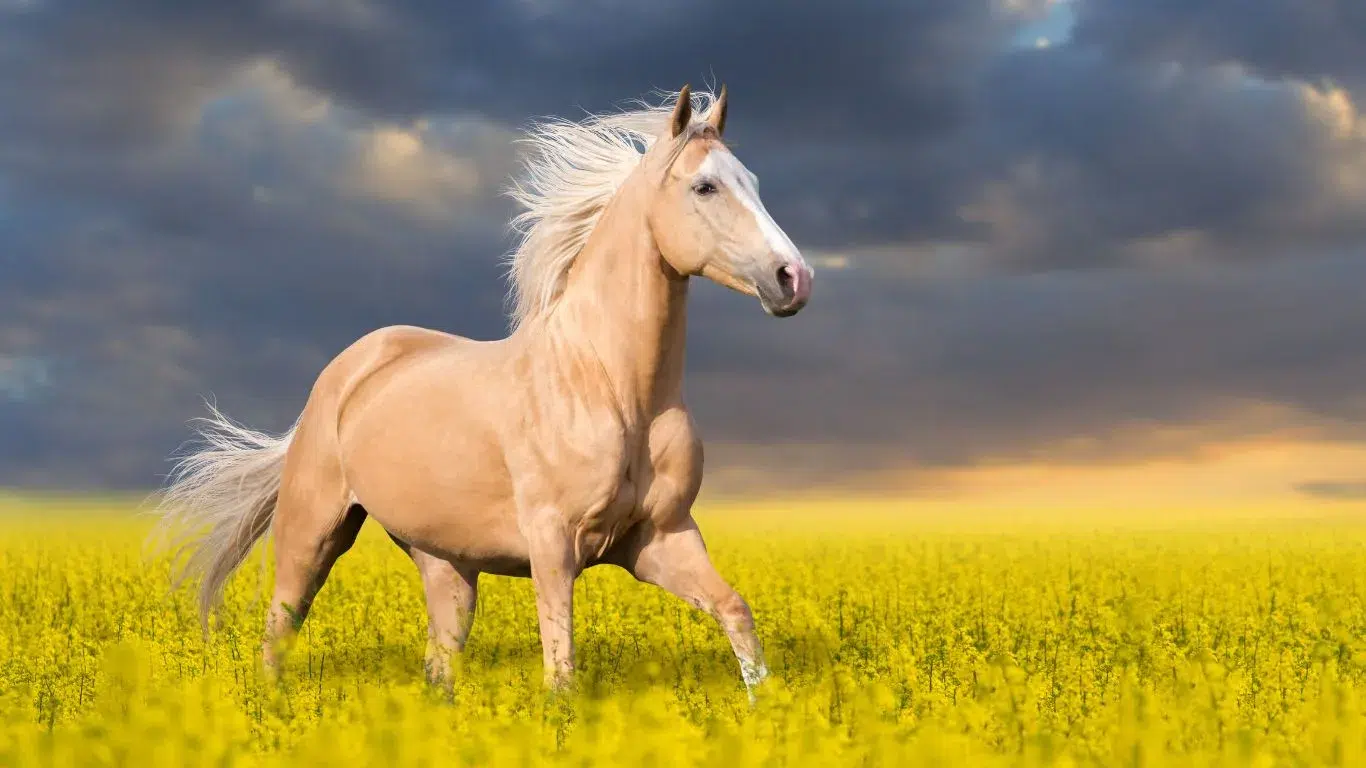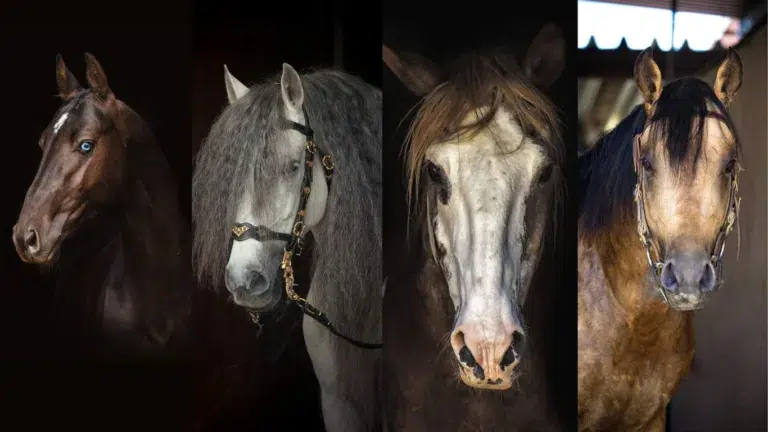Welcome to our article on horse lifespan, titled “Horse Lifespan: How Long Do Horses Live?” If you’re curious about how long horses live, you’ve come to the right place. Horses are magnificent creatures that have captivated humans for centuries. They have been our companions, partners in work, and even athletes. Understanding their lifespan, as explored in “Horse Lifespan: How Long Do Horses Live?” is crucial for ensuring their well-being and providing them with the care they need.
So, how long do horses live? On average, horses live for 25 to 30 years. However, it’s important to note that some horses have been known to live well into their 50s or 60s. The lifespan of a horse can be influenced by various factors, including nutrition, reproduction, diseases, dental health, and level of physical activity. Let’s delve deeper into these factors and explore how they affect a horse’s longevity.
Saddle Up The Essentials:
Factors Affecting Horse Lifespan
The lifespan of a horse can be influenced by various factors that contribute to their overall health and well-being. Understanding these factors can help horse owners make informed decisions regarding their care and provide them with the best chance of living a long and fulfilling life.
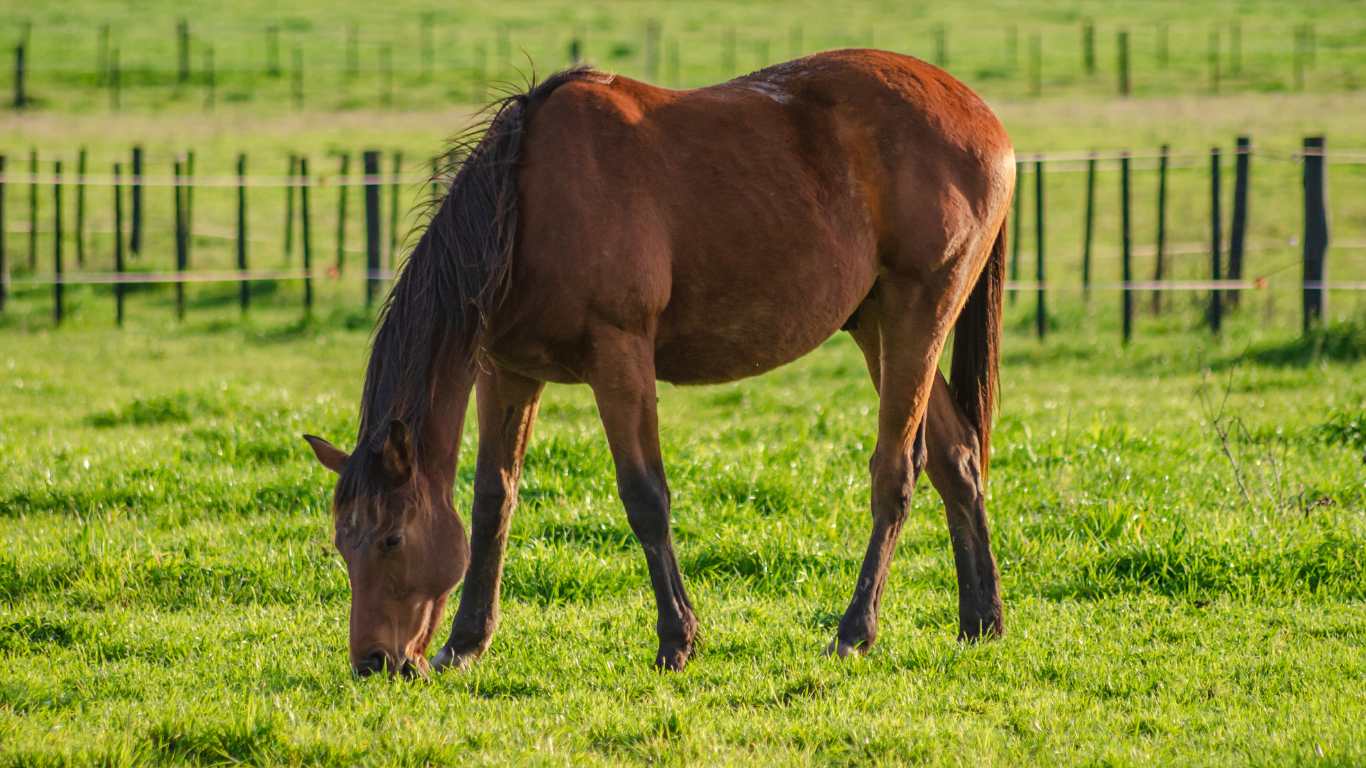
1. Breed and Genetics:
The breed of a horse can play a role in its lifespan. Smaller horse breeds tend to live longer than larger breeds. Additionally, genetics can contribute to certain health conditions or predispositions that may impact a horse’s longevity.
2. Nutrition:
Proper nutrition is essential for maintaining a horse’s health and extending their lifespan. A diet that provides the necessary vitamins, minerals, and nutrients is crucial. Horses should have access to fresh forage, such as hay or grass, along with a balanced concentrate feed if required. Adequate hydration is also important, so clean and freshwater should be readily available.
3. Exercise and Activity:
Regular exercise and activity are vital for a horse’s physical and mental well-being. Exercise helps to maintain muscle tone, promote cardiovascular health, and prevent weight-related issues. Horses should have space to roam and engage in natural behaviors, such as grazing and playing.
4. Environment:
A safe and clean environment is essential for a horse’s overall health and longevity. This includes proper shelter to protect them from extreme weather conditions and access to clean water. Good environmental management helps prevent injuries, spread of diseases, and stress-related issues.
5. Veterinary Care:
Regular veterinary care plays a significant role in maintaining a horse’s health. This includes routine check-ups, vaccinations, deworming, and dental care. Early detection of any health issues allows for prompt treatment and management.
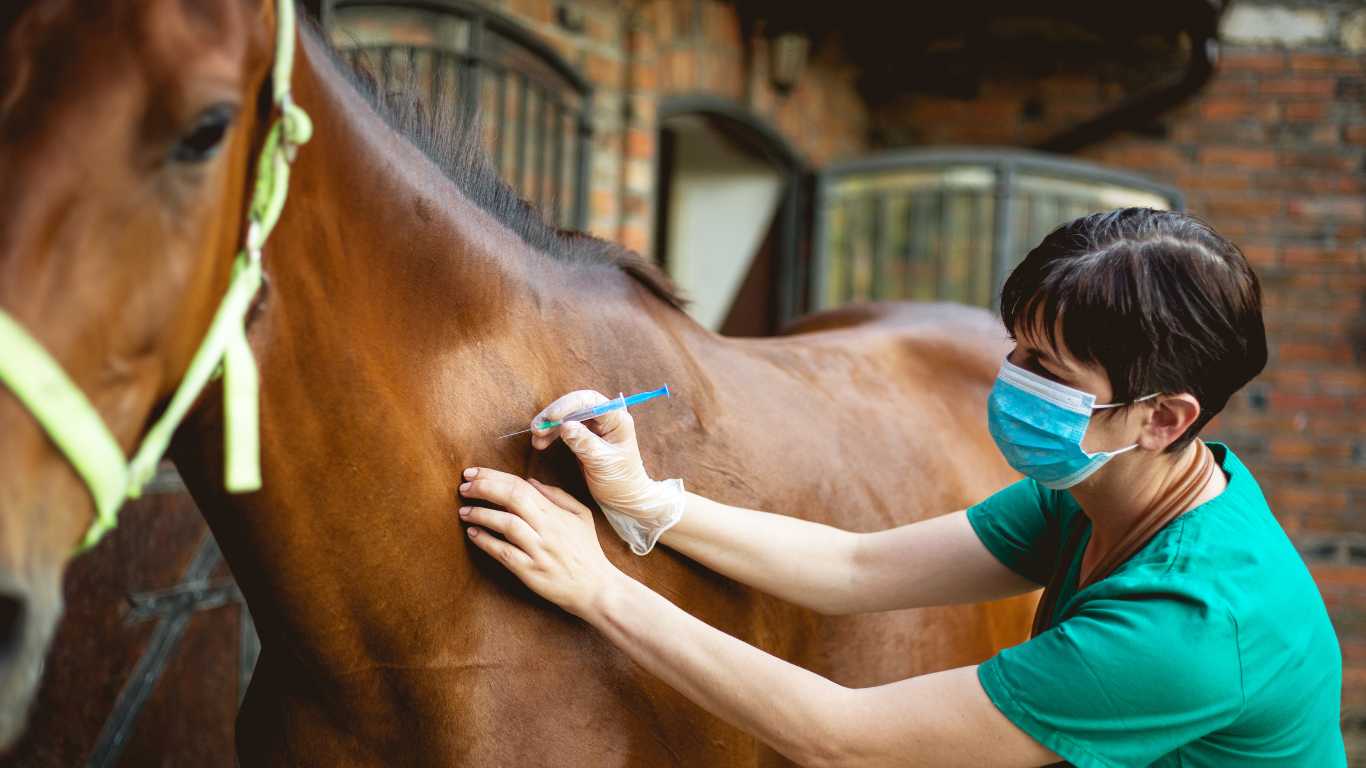
6. Hoof Care:
Proper hoof care is crucial for a horse’s soundness and well-being. Regular hoof trimming or shoeing, if recommended, helps prevent issues such as lameness or hoof imbalances.
7. Stress and Mental Stimulation:
Minimizing stress and providing mental stimulation are important for a horse’s overall health. Horses are social animals and should have opportunities for interaction with conspecifics to prevent feelings of isolation or anxiety.
8. Disease Management:
Timely and effective disease management is essential to ensure a horse’s health and longevity. This includes prevention measures such as vaccination programs and timely treatment of any illnesses or injuries.
“Providing a balanced diet, regular exercise, proper hoof care, and a safe environment are some of the factors that can contribute to a horse’s longevity.”
In brief, a horse’s lifespan is influenced by various factors, including breed, nutrition, exercise, environment, veterinary care, and disease management. By implementing appropriate measures, horse owners can enhance their horse’s health, happiness, and overall longevity.
Nutrition and Diet
When it comes to horse nutrition, a well-balanced diet is essential for their overall health and well-being, which directly impacts “How Long Do Horses Live??” A horse’s diet should primarily consist of hay or grass, as these provide the necessary fiber, vitamins, and minerals. It’s recommended to feed horses small meals throughout the day, mimicking their natural grazing behavior.
Avoid overfeeding grain to horses as it can lead to joint problems and digestive issues. Instead, grain should be fed sparingly and primarily used as a supplement for horses with higher energy requirements. It’s always best to consult with a veterinarian or equine nutritionist to determine the appropriate amount and type of grains for your horse, especially when considering “How Long Do Horses Live??”
When making changes to a horse’s diet, it’s important to do so gradually. Sudden dietary changes can disrupt their digestive system, leading to colic or other digestive problems. Slowly introducing new feeds over a period of time allows their gut to adjust and reduces the risk of digestive issues.

Furthermore, horses should have constant access to fresh water and forage. Water is important for digestion, temperature regulation, and overall hydration. On average, horses consume around 10 to 12 gallons of water per day, so it’s crucial to ensure they have access to clean water at all times.
Importance of Proper Nutrition
Providing the right nutrition plays a vital role in maintaining a horse’s overall health. A well-balanced diet supports their immune system, promotes healthy digestion, and provides the necessary nutrients for optimal growth and development.
“A healthy diet can help prevent various health conditions, including metabolic disorders and nutrient deficiencies,”
– Dr. Emily Wilson, a renowned equine veterinarian.
Feeding an appropriate diet based on a horse’s age, activity level, and specific nutritional needs is essential. Horses in intense training or with high energy demands may require specialized feeds or supplements to meet their nutritional requirements. It’s always recommended to work with a knowledgeable equine nutritionist or veterinarian to ensure your horse’s nutritional needs are being met.
Horse Nutrition Table
| Nutrient | Role | Sources |
|---|---|---|
| Protein | Building blocks for muscle and tissue growth | Legume hays, soybean meal |
| Vitamins | Essential for overall health and metabolic functions | Hay, fresh pasture, fortified feeds |
| Minerals | Required for various bodily functions | Mineralized salt blocks, balanced feeds |
| Fiber | Aids in digestion and maintains gut health | Hay, grass, beet pulp |
| Fat | Provides concentrated energy and supports coat health | Rice bran, vegetable oils |
It’s important to note that the nutritional needs of horses may vary based on their age, breed, activity level, and any specific health concerns. Regular monitoring of their body condition, along with veterinary advice, can help ensure they receive a nutritionally balanced diet for optimal health and longevity.
Veterinary Care
Regular veterinary care is crucial for the health and longevity of your horse. By providing essential medical attention, you can ensure that your horse stays happy and healthy for years to come.
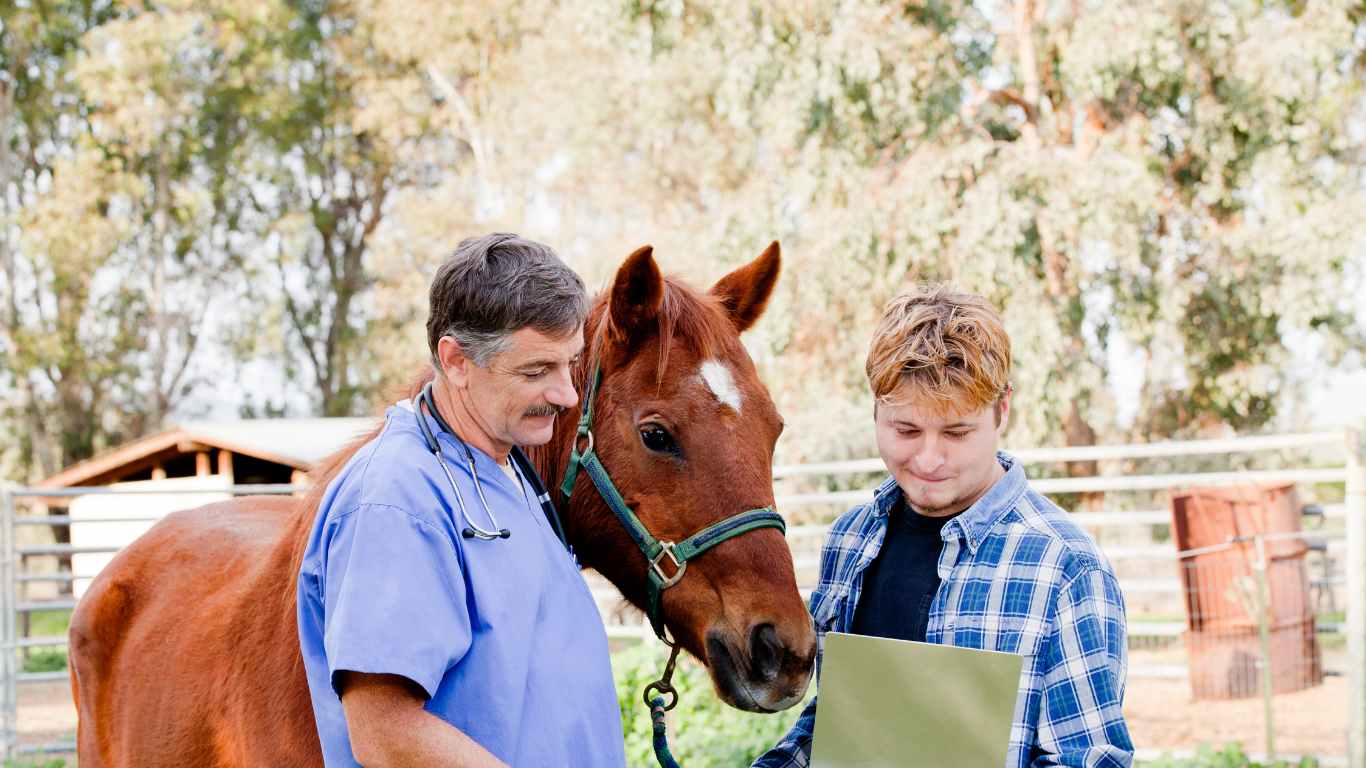
Horse Vaccinations
Vaccinations play a vital role in protecting your horse from common illnesses and diseases. Regular vaccinations can prevent the spread of contagious diseases and significantly reduce the risk of infection. Consult with your veterinarian to create an appropriate vaccination schedule tailored to your horse’s specific needs.
Horse Deworming
Deworming is an essential aspect of equine veterinary care. Regular deworming helps control and prevent parasitic infections in horses. Parasites can cause significant health issues and affect your horse’s overall well-being. Your veterinarian will recommend a deworming schedule based on your horse’s age, exposure to parasites, and other factors.
Horse Dental Care
Proper dental care is crucial for your horse’s health and wellbeing. Regular dental check-ups and treatments can prevent tooth problems and ensure proper chewing and digestion. Dental issues can affect your horse’s ability to eat and may lead to weight loss or other health complications. It is recommended to have a qualified equine dentist or veterinarian examine your horse’s teeth at least once a year.
| Veterinary Care | Frequency |
|---|---|
| Vaccinations | Annually or as recommended by your veterinarian |
| Deworming | Every 6-8 weeks or as recommended by your veterinarian |
| Dental Check-ups | At least once a year or as recommended by your veterinarian |
| Regular Check-ups | At least once a year |
Horse Housing and Environment
Horses require a suitable housing environment to ensure their well-being and protect them from the elements. A clean and safe living space, such as a barn or a three-sided structure, is essential for their comfort and safety.

Regular cleaning and maintenance of the horse’s living area is crucial to prevent the build-up of dirt, dust, and harmful bacteria. This helps maintain a hygienic environment that promotes good health. Providing adequate water, minerals, and shelter during extreme weather conditions is also vital for their overall well-being.
When designing a horse shelter, it’s important to consider the following factors:
- Size: The shelter should be spacious enough to accommodate the horse comfortably, allowing ample room for movement.
- Ventilation: Proper airflow is crucial to prevent the accumulation of humidity and ammonia, which can lead to respiratory problems. Good ventilation helps maintain a fresh and healthy environment.
- Lighting: Natural lighting is preferred to artificial lighting, as it provides the horse with a more natural and comfortable environment. However, proper lighting should be ensured, especially during the nighttime.
- Drainage: The area surrounding the shelter should have proper drainage to prevent water accumulation and ensure a dry environment.
A well-designed horse housing environment contributes to the horse’s physical and mental well-being. It provides them with a sense of security, protection from the elements, and a space where they can relax and rest.
Creating an enriched environment with opportunities for exercise, social interaction, and mental stimulation is equally important. Providing access to pasture, toys, and other forms of environmental enrichment helps keep horses physically and mentally engaged.
Comparison of Different Types of Horse Shelters
| Shelter Type | Advantages | Disadvantages |
|---|---|---|
| Barn | Provides maximum protection from the weather, ample storage space for feed and equipment, and a controlled environment for horse care activities. | Requires regular cleaning and maintenance, may restrict natural movement, may involve higher construction and maintenance costs. |
| Three-Sided Structure | Offers protection from wind and rain, allows for natural airflow, provides a sense of openness for the horse. | Less secure than a fully enclosed shelter, may not provide adequate protection during severe weather conditions. |
| Run-in Shed | Allows horses to come and go as they please, provides shade and protection from the sun, suitable for an open-field environment. | May not provide enough protection during extreme weather, requires proper placement to ensure good drainage. |
| Pasture with Natural Shelter | Utilizes natural landscape features, such as trees or hills, to provide protection and shade, mimics a more natural environment. | Availability of natural shelter depends on the pasture location, may not provide complete protection from all elements. |
Exercise and Activity
All horses need regular exercise and activity to maintain their fitness and overall well-being. Engaging in horse exercise and equine activities not only benefits their physical health but also provides mental stimulation.
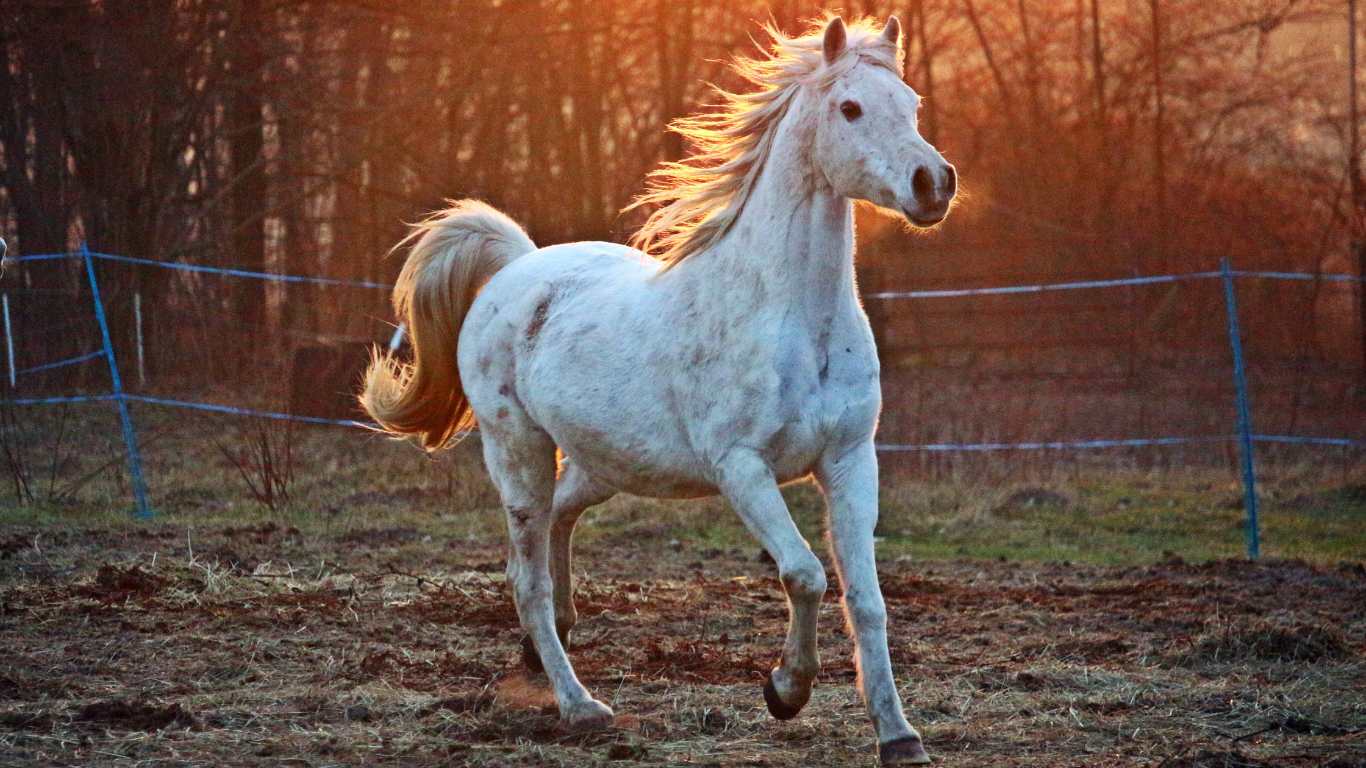
Riding is a popular form of horse exercise as it helps strengthen the horse’s muscles and improves their cardiovascular fitness, which can be a significant factor in answering the question, ‘How Long Do Horses Live??’ Whether leisurely trail riding or engaging in competitive sports, riding allows horses to move and stretch their bodies, promoting flexibility and coordination.
Aside from riding, access to a pasture for walking is essential for horses. The opportunity to graze and roam freely helps them engage in natural behaviors and promotes healthy digestion. Walking on varied terrain stimulates the horse’s hooves, contributing to overall hoof health. This is particularly important when considering ‘How Long Do Horses Live??’ as hoof health is crucial to their overall longevity.
Stalls, on the other hand, should only be used as recommended by a veterinarian due to the potential risk of injury. While stall confinement may be necessary in certain situations, such as for horses recovering from an illness or injury, it is important to provide regular exercise and activity outside the stall to prevent stiffness and promote mental well-being.
The Benefits of Regular Exercise for Horses
“Regular exercise helps maintain muscle tone and overall fitness in horses, enhancing their physical performance and reducing the risk of certain health issues.”
When horses engage in regular exercise, it helps increase their cardiovascular endurance, making them better equipped to handle physical exertion. This is particularly beneficial for horses involved in competitive disciplines such as show jumping, dressage, or racing, where stamina plays a crucial role. Understanding the importance of exercise in a horse’s life also brings to light another significant question: “How Long Do Horses Live??”
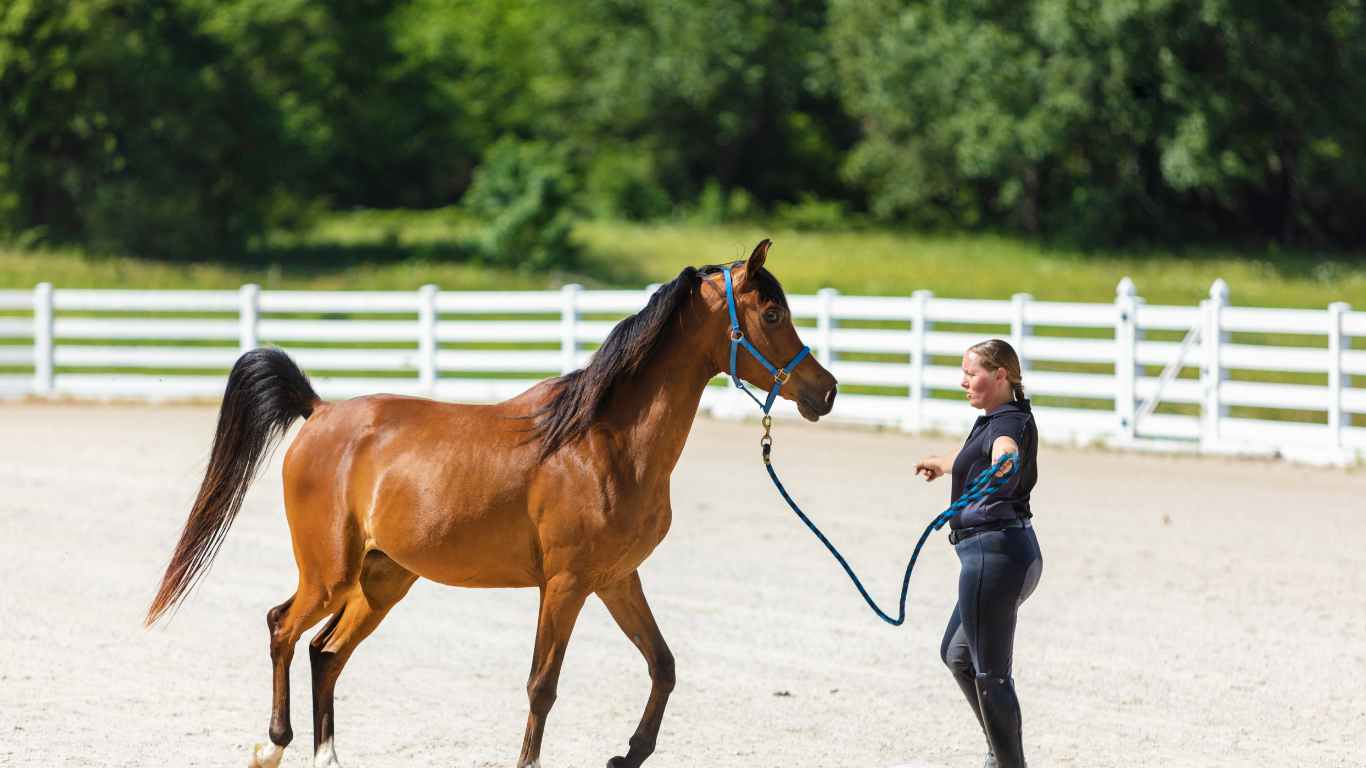
Exercise also helps prevent weight gain and obesity, as it burns calories and promotes a healthy metabolic rate. Overweight horses are more prone to various health issues, including metabolic disorders and joint problems. Regular exercise helps maintain a healthy body weight and reduces the risk of these conditions, thereby potentially influencing the answer to the inquiry, “How Long Do Horses Live??”
Muscle development and strength are other key benefits of horse exercise. When horses engage in regular physical activity, their muscles become stronger and more toned, enhancing their athletic performance. Strong muscles also contribute to better posture and overall balance.
Furthermore, exercise provides mental stimulation for horses, helping alleviate boredom and reduce stress. Horses that have regular opportunities for movement and activity tend to be happier and more mentally content.
Horse Fitness: Sample Exercise Routine
| Activity | Frequency | Duration |
|---|---|---|
| Trail Riding | 3-4 times a week | 45-60 minutes |
| Dressage Training | 2-3 times a week | 30-45 minutes |
| Lunging or Round Pen Work | 1-2 times a week | 15-20 minutes |
| Turnout in a Pasture | Daily | 2-4 hours |
Remember, each horse has unique exercise requirements, and their fitness routine should be tailored according to their age, breed, and overall health. Consulting with a professional trainer or equine veterinarian can help create a personalized exercise plan that suits your horse’s specific needs and goals.
In order to maintain your horse’s overall health, proper hoof care is crucial. Taking care of your horse’s hooves involves regular trimming and, in some cases, the use of shoes for added support. Neglecting hoof care can lead to discomfort and lameness, impacting your horse’s overall well-being.
Regular Trimming
Regular hoof trimming is essential to keep your horse’s hooves in optimal condition. Trimming helps prevent overgrowth, which can cause difficulties in movement and lead to various hoof problems. By maintaining a proper hoof length, you can help prevent discomfort and ensure your horse’s ability to move freely and comfortably.
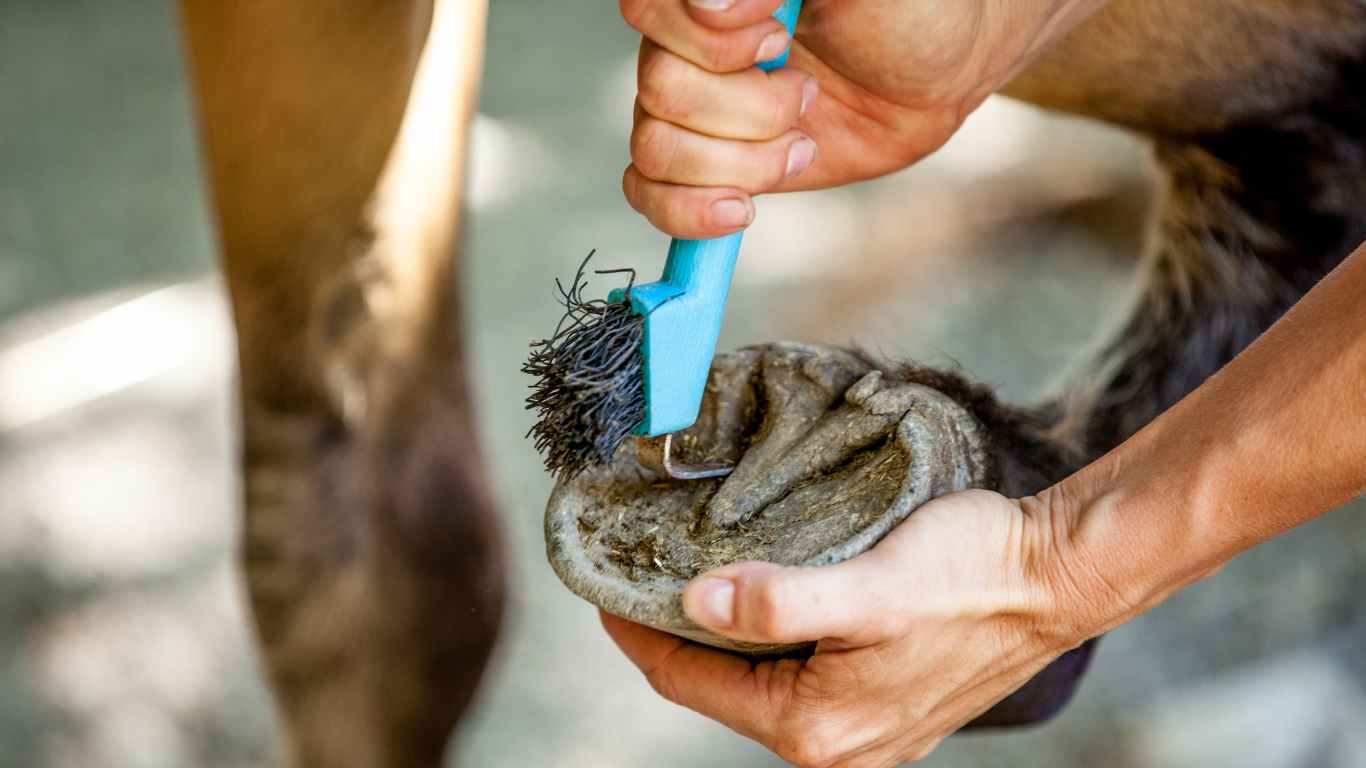
Shoeing for Added Support
Some horses may require shoes for added support, especially if they are involved in activities such as jumping, racing, or heavy work. Shoes can help protect the hooves from excessive wear and tear, provide additional traction, and offer support for horses with certain hoof conditions. Consulting with a horse farrier will help determine if your horse needs shoes and the appropriate type of shoe for their specific needs.
It’s important to note that while shoeing can provide benefits, it should not be relied upon as a substitute for proper hoof care. Regular sessions with a farrier are essential to ensure proper shoeing, as well as to address any other hoof issues.
| Common Hoof Problems | Symptoms | Treatment |
|---|---|---|
| Thrush | Strong, unpleasant odor Black, gooey discharge Hoof sensitivity | Clean the hoof thoroughly Apply antimicrobial treatment Provide a clean and dry environment |
| White Line Disease | Separation of the hoof wall Discoloration of the white line Hoof wall crumbling | Removal of infected hoof material Treating with antifungal agents Corrective trimming and shoeing |
| Laminitis | Lameness Increased digital pulse Hoof tenderness | Immediate veterinary attention Restricted diet Orthopedic support and pain management |
Regular farrier visits play a crucial role in maintaining your horse’s hooves and overall hoof health. Working closely with a skilled farrier ensures that your horse receives the necessary care and attention to keep their hooves in optimal condition, prevent problems, and promote their well-being.
Lifespan of Wild Horses and Different Breeds

When it comes to the lifespan of horses, there are several factors that come into play. ‘How Long Do Horses Live??’ is a question that often arises in this context. Domestic horses, in general, tend to live longer than their wild counterparts. This can be attributed to the availability of balanced diets, regular veterinary care, and the provision of a safe and comfortable living environment.
However, the lifespan of horses can also vary depending on their breed. Different horse breeds may have slightly different lifespans, with smaller breeds often outliving larger ones. This can be due to various factors such as genetic differences, metabolism, and overall health.
While domestic horses typically live for 25 to 30 years, wild horses have been known to have a shorter lifespan. ‘How Long Do Horses Live??’ becomes an interesting question in this regard. On average, wild horses live up to 36 years, although there have been exceptions where some have surpassed this age. In fact, the oldest known domestic horse lived to be an impressive 62 years old.
The Table below provides a comparison of the average lifespan of select horse breeds:
| Horse Breed | Average Lifespan |
|---|---|
| Shetland Pony | 30-35 years |
| Arabian Horse | 25-30 years |
| Thoroughbred | 25-30 years |
| Clydesdale | 20-25 years |
| Friesian Horse | 20-25 years |
As seen in the table, smaller horse breeds such as the Shetland Pony tend to have a longer lifespan, while larger breeds like the Clydesdale and Friesian Horse have a shorter lifespan.
Understanding the lifespan of wild horses and different horse breeds is important for horse owners and enthusiasts alike. It allows for better care and management practices to ensure the well-being and longevity of these magnificent creatures.
Join the Pet Planet Diaries
Sign up for our newsletter to get the latest tips, stories, and exclusive insights into the wonderful world of pets.
Final Remarks
After exploring the various factors that affect horse lifespan, it is clear that providing the right care and environment is crucial for ensuring the well-being and longevity of these magnificent creatures. On average, horses live between 25 and 30 years, although this can vary depending on breed, care, and individual health.
Proper nutrition plays a vital role in horse lifespan. A diet consisting mainly of hay or grass, along with regular access to fresh water, promotes overall health. Veterinary care is also essential, including vaccinations, deworming, dental care, and regular check-ups. By addressing these needs, you can give your horse the best chance at a long and healthy life.
Exercise and activity are equally important. Regular exercise helps maintain muscle tone and overall fitness, while a suitable living environment, such as a clean and safe shelter, protects horses from extreme weather conditions. Additionally, proper hoof care, including regular trimming and farrier visits, ensures that your horse remains comfortable and mobile.
By understanding and implementing these key factors, you can enhance your horse’s lifespan and provide them with a fulfilling and enriching life. Remember, a happy and healthy horse is a horse that can thrive for many years to come.
FAQ
How long do horses live?
The average horse lives for 25 to 30 years, but some have been known to live into their 50s or 60s.
What factors affect a horse’s lifespan?
Factors that affect a horse’s lifespan include nutrition, reproduction, diseases, dental health, and level of physical activity.
How can I contribute to my horse’s longevity?
Providing proper nutrition, regular veterinary care, dental care, hoof care, and a safe and clean environment can contribute to a horse’s longevity.
What should a horse’s diet consist of?
A horse’s diet should consist mainly of hay or grass, with small meals throughout the day. Grain should be fed sparingly as it can lead to joint problems. Gradual changes in diet are recommended to avoid digestive problems. It’s important to provide constant access to food and water.
What veterinary care is crucial for a horse’s health and longevity?
Regular veterinary care is crucial for a horse’s health and longevity. This includes vaccinations, deworming, dental care, and regular check-ups. Vaccinations protect against common illnesses, while dental care ensures proper chewing and prevents tooth problems. Regular deworming helps control parasites.
What kind of housing and environment does a horse need?
Horses need a clean and safe place to live, such as a barn or three-sided structure, to protect them from the weather. Regular cleaning and maintenance of the living area are important. Providing adequate water, minerals, and shelter during extreme weather conditions is crucial for their well-being.
How much exercise do horses need?
All horses need regular exercise and activity. This includes regular riding and access to a pasture for walking. Stalls should only be used as recommended by a veterinarian due to injury. Regular exercise helps maintain muscle tone and overall fitness in horses.
What is the importance of hoof care for horses?
Proper hoof care is essential for a horse’s overall health. Hooves should be trimmed regularly, and some horses may need shoes for added support. Overgrown hooves can lead to discomfort and lameness, so regular farrier visits are important.
Do wild horses live longer than domestic horses?
Domestic horses tend to live longer than wild horses due to the availability of balanced diets, veterinary care, and regular shelter. different horse breeds may have slightly different lifespans, with smaller breeds living longer than larger breeds. Wild horses have been known to live up to 36 years, while the oldest domestic horse lived to be 62.
How can I summarize the horse lifespan information?
The average lifespan of a horse is between 25 and 30 years but can vary depending on factors such as breed, care, and individual health. Providing proper nutrition, veterinary care, exercise, hoof care, and a suitable environment can help horses live longer and healthier lives. Understanding the factors that affect horse lifespan is key to ensuring the well-being of these majestic animals.

